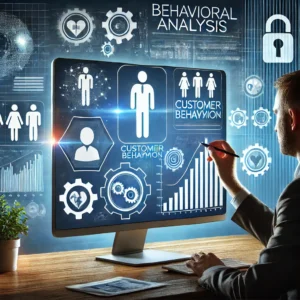Behavioral Analysis in Business
Behavioral analysis in business involves studying human behavior to gain insights into decision-making, patterns, and trends. This field focuses on understanding how individuals and groups act, particularly in a business environment, to improve strategies, products, and customer experiences.

What is Meant by Behavioral Analysis?
Behavioral analysis examines the underlying factors driving people’s actions. In business, this means analyzing employee behavior, consumer choices, or market trends to make data-driven decisions.
What is an Example of Behavioral Analysis?
A common example is customer behavior analysis in retail. By tracking how customers navigate a store or website, businesses can identify which products attract attention and which areas need improvement. For instance, if shoppers frequently abandon their carts online, behavioral analysis can pinpoint reasons—like hidden costs or a complicated checkout process.
What are the Three Types of Behavior Analysis?
- Descriptive Analysis: Observes and records behavior without influencing it.
- Predictive Analysis: Uses past data to forecast future behavior.
- Prescriptive Analysis: Suggests actions based on predictive insights to optimize outcomes.
What Do You Mean by Behavioral Analytics?
Behavioral analytics involves collecting and interpreting data about individuals’ actions. Businesses use it to understand how customers or employees interact with their systems and to improve services or performance.
Types of Behavioral Analysis in Business
- Customer Behavior Analysis: Focuses on purchasing patterns, website interactions, and feedback.
- Employee Behavior Analysis: Examines work habits, productivity, and engagement.
- Market Behavior Analysis: Studies industry trends and competitor actions.
Behavioral Analysis in Business Examples
- E-commerce: Analyzing click-through rates and purchase history to personalize recommendations.
- HR Analytics: Assessing employee performance data to identify training needs.
- Marketing Campaigns: Testing different messages to see which resonates most with the target audience.
Importance of Behavioral Analysis in Business
- Better Decision-Making: Provides data-driven insights for strategic planning.
- Enhanced Customer Experience: Tailors services to meet customer needs.
- Increased Efficiency: Identifies areas for improvement in processes or employee performance.
Behavioral Analytics Examples
- Netflix: Uses viewing behavior to recommend shows.
- Amazon: Suggests products based on past purchases and search history.
- Sales Teams: Tracks client interactions to forecast future sales.
Behavioral Analytics in Cyber Security
In cybersecurity, behavioral analytics detects abnormal user behavior that might indicate threats. For example, if an employee suddenly accesses sensitive files outside of their typical pattern, it could signal a security breach.
Behavioral Analytics Course
Several courses cover behavioral analytics, teaching skills like data interpretation, predictive modeling, and customer segmentation. These courses are valuable for professionals in marketing, HR, and cybersecurity.
Behavioral analysis offers businesses a powerful tool to understand and predict behavior, improving decision-making and enhancing customer and employee experiences.

Business Analyst , Functional Consultant, Provide Training on Business Analysis and SDLC Methodologies.
